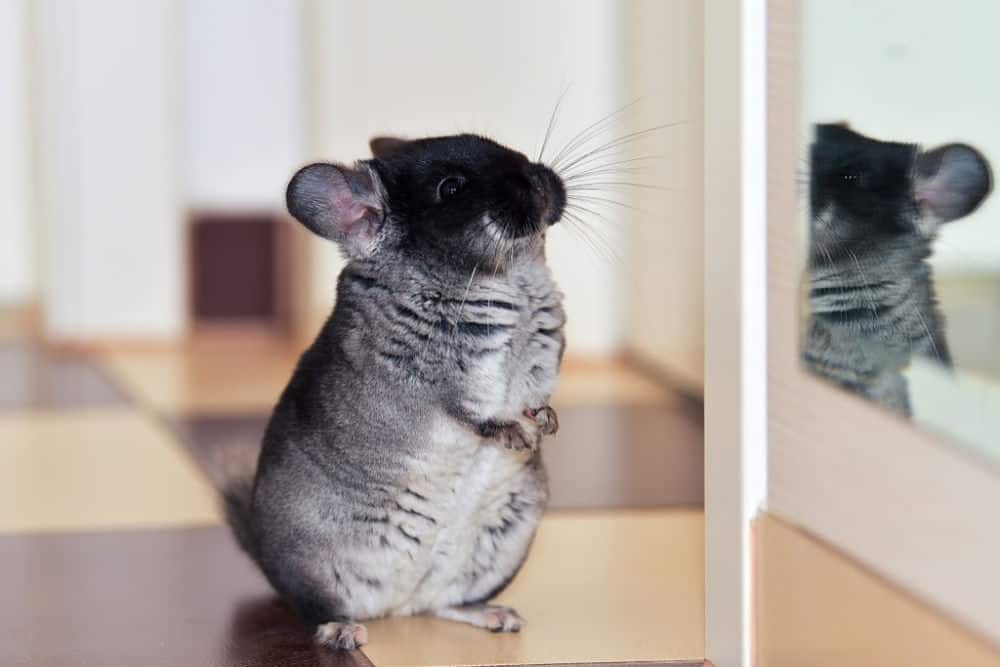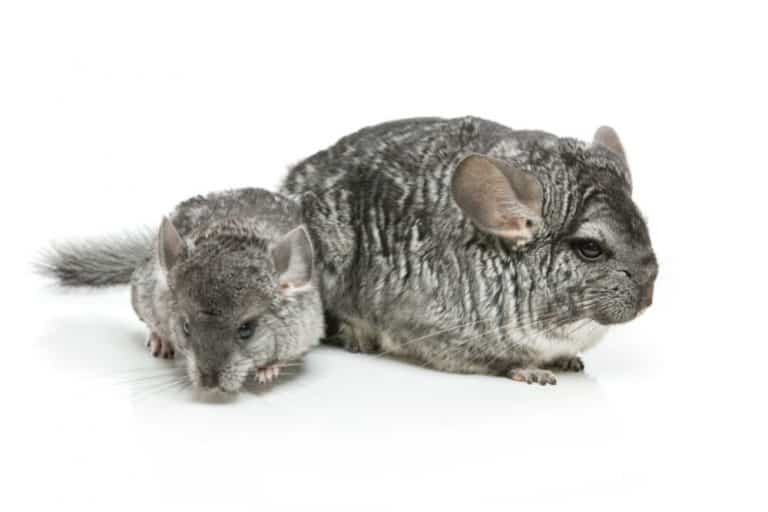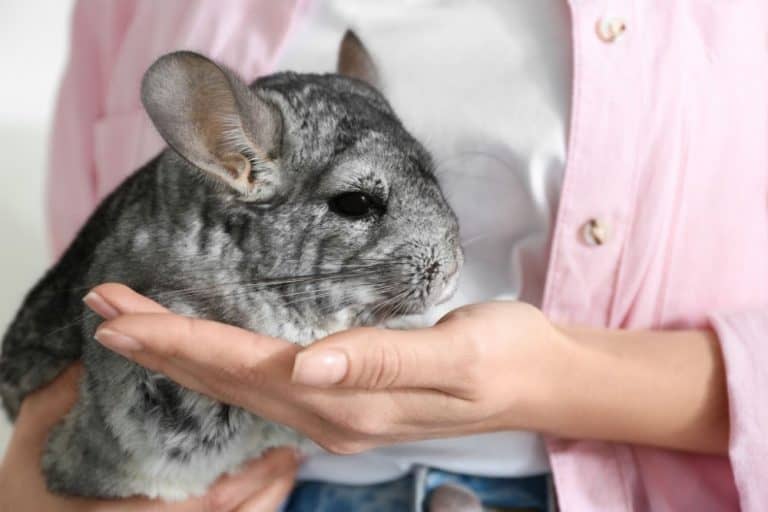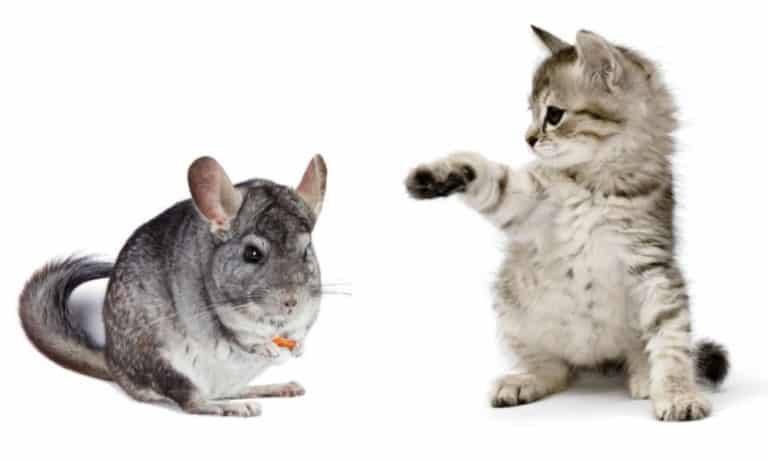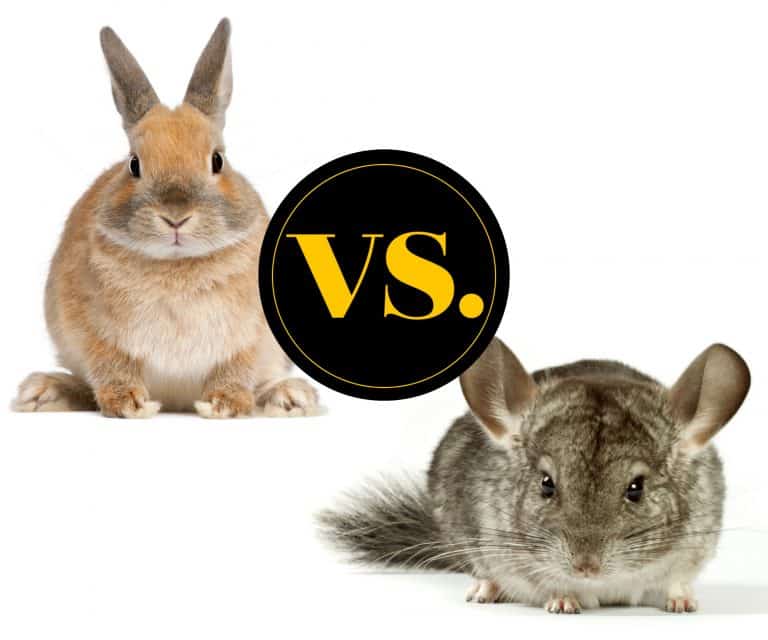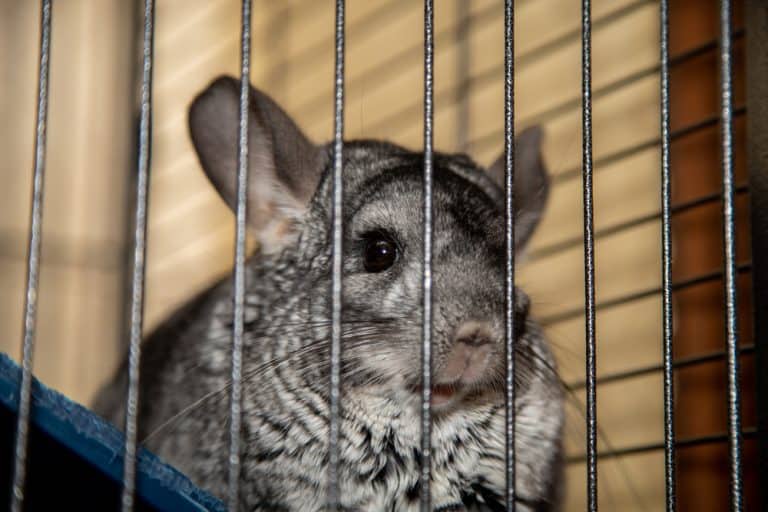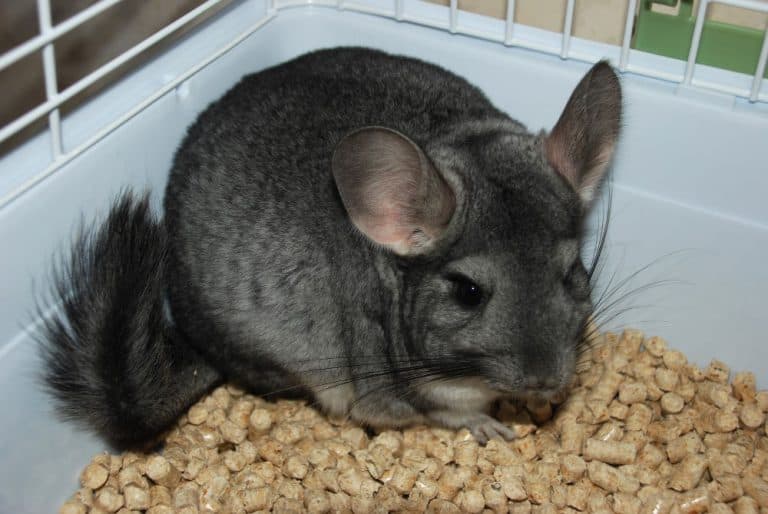Is Your Chinchilla Overweight? How to find out
Chinchillas make adorable pets; they are friendly, fun, and entertaining. They also have a long lifespan of between fifteen and twenty years. Chinchillas commonly suffer from a few health problems, and if they’re not fed the correct diet can end up overweight.
You may have noticed that your chinchilla can sit up and beg. While this looks cute, it has encouraged many chinchilla owners to feed their pets more treats than are good for them, and their pets have become overweight. Some owners have even made the mistake of feeding their pets human treats like cookies or potato chips.
It may not always be obvious to tell whether a chinchilla is a correct weight or not, as these animals do vary in size. This article will explain how to know if your chinchilla is overweight and what you can do about it. It’s essential to feed your chinchillas the right foods, or they can quickly gain weight.
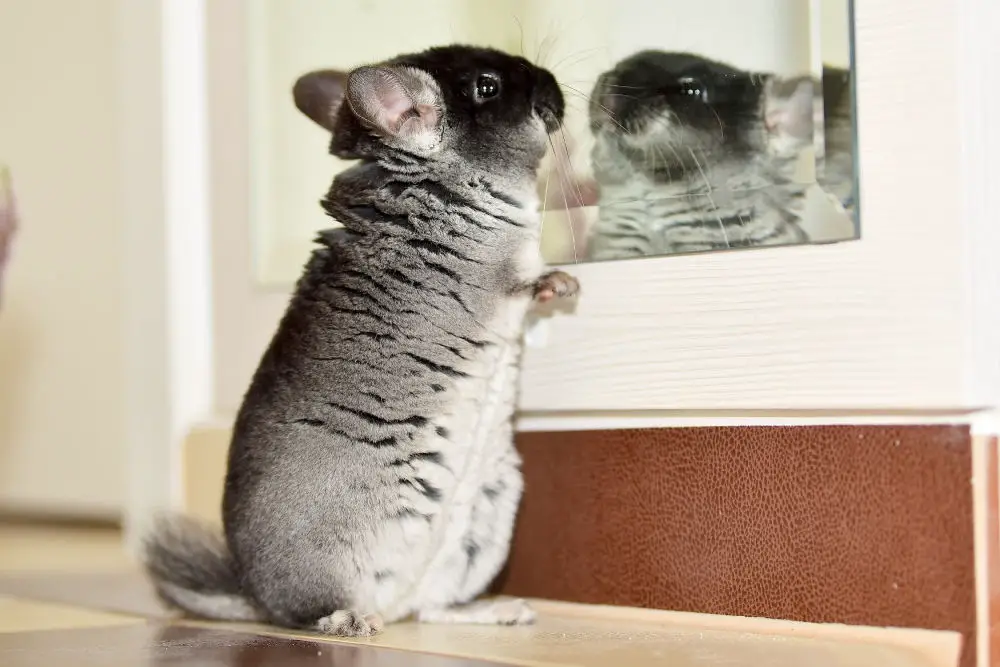
How Can I Tell if My Chinchilla is Overweight?
One of the simplest (and obvious) ways to determine if your chinchilla is overweight is to weigh it. By weighing your chinchilla regularly, you learn what a ‘normal weight’ is for your pet and can monitor fluctuations in weight gain or losses. Another option is to visually observe your pet and look for any fat rolls or other weight gain indicators.
Once your chinchilla is fully grown, it shouldn’t gain weight but rather maintain a steady weight over time. In general, if chinchillas are well looked after and fed a healthy diet, they won’t get fat. Your pet may seem like it eats a lot because it’s probably constantly nibbling on hay, or gnawing at wood. However, hay contains few calories and doesn’t make your chinchillas fat. Chinchillas are also naturally very active animals, especially at night, and this will help them maintain a healthy weight.
Although, if a chinchilla is fed incorrect foods or offered excess treats, it can put on weight. If chinchillas are given fatty foods such as nuts and seeds, they are likely to get fat. Not getting enough exercise can also make the problem worse. Chinchillas also have very dense fur, which makes them look quite round, like a puffball even if they’re not overweight.
It’s also essential to keep in mind that some chinchillas are naturally larger than others due to their genetics. With all these different factors to consider, it can be challenging to determine if your pet is overweight.
It’s quite rare to see chinchillas that are very obese, but some may be a bit on the chunky side. If you think your chinchilla may be overweight, you should look out for the following signs to confirm this.
How Much Should a Chinchilla Weigh?
The best way to tell if your chinchilla is overweight is to get a scale and weigh them. When purchasing a scale, make sure that it can weigh in small increments to get an accurate measure of your chinchillas’ weight.
Your chinchillas’ healthy weight will depend on whether it’s male or female and also what type of chinchilla you have. Females chinchillas are usually slightly larger than males on average.
There are also two types of chinchillas:
- short-tailed, which are heavier
- long-tailed, which are generally smaller
It’s also important to remember that some chinchillas can be slightly larger than average due to their genetic make-up.
As a rough weight guide:
- Long-tailed chinchillas usually weigh between 370 and 490g
- Short-tailed chinchillas are bigger and heavier, weighing between 1.1kg and 1.4kg on average.
Reminder: 1 kg is equal to 1000 grams
So you can see that short-tailed chinchillas weigh roughly twice that of a long-tailed chinchilla. In both species of chinchilla, the females are at the heavier end, and males are slightly smaller and lighter.
However, merely weighing a chinchilla isn’t always reliable for determining whether or not your pet is overweight. If you do not have a growth history or a baseline weight for your specific chinchilla, it is hard to know what is a ‘normal’ weight for your particular animal.
If you own a long-tailed chinchilla and it weighs 600g, you’ll see that this is about 100g heavier according to the average weight range. So the number on the scale isn’t immediately a sign that your pet is fat or unhealthy, as some chinchillas are slightly larger just because of their genetics.
Look at Your Chinchilla to See if its Overweight
It can be hard to tell if your chinchilla is overweight or not, just by looking at it. Chinchillas have very dense fur and look like puffballs, even if they’re a healthy weight. Just because your chinchilla looks big, it’s not proof that it’s overweight.
To determine whether your chinchilla is overweight, you can hold your pet under its armpits. When holding your chinchilla in this way, look at your hands. If your chinchilla has rolls of fat that sit over your fingers, it’s likely that the animals overweight.
If rolls of fat are present, you’ll be able to see and feel them. It’s normal for chinchillas to have small amounts of loose skin in this area, and this shouldn’t be mistaken for fat. This method allows you to compare your chinchillas and doesn’t rely solely on measuring their weight.
Is Your Chinchilla Eating Too Much?
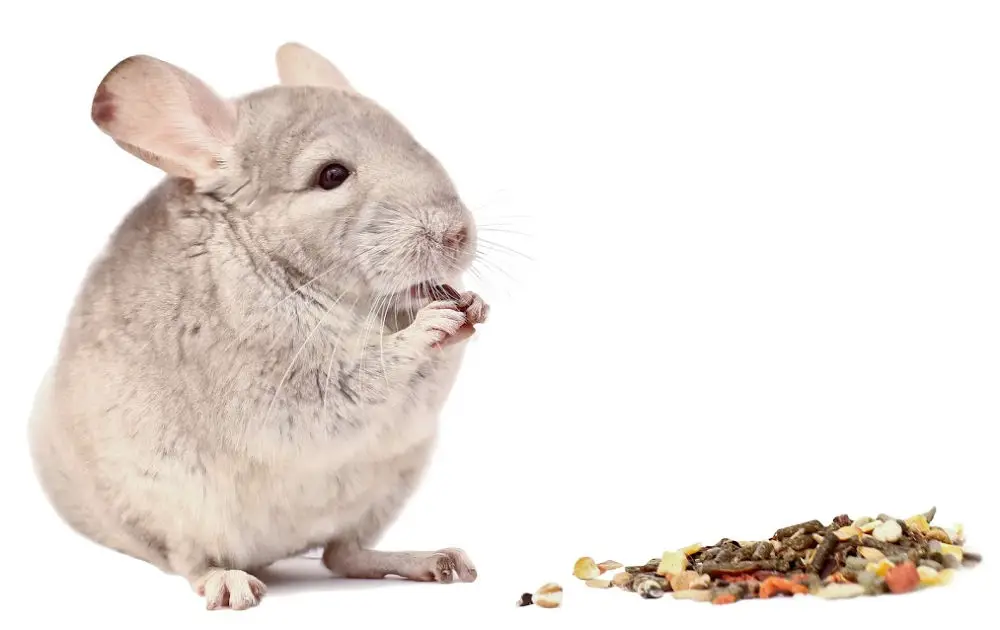
If you notice that your chinchilla seems to be overeating, you may think it is a problem. However, it is only a problem if your chinchilla is overweight. Chinchillas do eat lots of hay, and this should always be available to them. Hay should make up 80% of their diet. Timothy hay or orchard grass is not high in calories and won’t make your chinchilla put on weight.
Eating lots of hay provides your chinchilla with fiber, which helps its digestive system. Hay is also low in protein and fat and helps to wear down a chinchilla’s continually growing teeth. Your chinchilla needs to eat lots of hay to survive.
If your chinchilla is being fed the correct diet, it most likely will not overeat or get fat. The problem with weight issues in chinchillas is caused by being fed other foods such as fruit and vegetables and not enough hay. Chinchillas should only be given minimal amounts of fruit as its high in sugar. And they should always have a constant supply of fresh hay.
Some owners also give their chinchillas treats such as nuts and seeds that are unsuitable, these are fattening and shouldn’t be given to chinchillas. If you have been giving you chinchilla lots of treats, this is likely to be the cause of its weight gain.
Chinchillas and Exercise
Chinchillas are usually active animals. They are most active during the early morning and evening hours and need plenty of exercise. Your chinchilla should be scampering and jumping about in its cage regularly. You should also give your chinchilla plenty of free time out of its cage and allow it to run around. Chinchillas often run around as fast as they can when you let them out of their enclosures. If your chinchilla doesn’t seem to want to run around, this is likely a bad sign. Having an inactive chinchilla can be bad for your pet’s health.
Although a lack of exercise alone won’t cause weight gain, if your chinchilla is fed an incorrect diet, it can contribute to your chinchilla’s weight issues. You may consider investing in a chinchilla wheel, which will allow your chinchilla to run while in its cage. This will mean that your pet won’t have to rely on you to let it out of its cage for exercise and may encourage your pet to be more active.
Gut Problems in Chinchillas
Chinchillas are sometimes prone to a gut problem called ‘gastrointestinal stasis.’ This condition causes the passage of food through the intestines to become slower than usual. Eventually, this problem can cause blockages in a chinchilla’s gut. The condition can occur alongside gastrointestinal dilation, a health problem that causes ingested food to accumulate in the stomach, intestines, and cecum.
A poor diet most likely the cause of any gut issues. If your chinchilla is suffering from any type of intestinal problems, it’s likely going to result in weight gain. The most common reason that chinchillas can have gut problems is that they are not fed sufficient amounts of hay.
There are signs you should look out for, which would indicate that your pet is suffering from gut problems. The most common symptom is that they stop eating. You may also notice that your chinchilla is going to the toilet less and that its pellets are smaller. Alternatively, your chinchilla may have diarrhea. Or may look bloated, because it has a build-up of undigested food and gas in its stomach.
Problems with the stomach won’t cause weight gain in the traditional sense. Your chinchilla’s fat reserves won’t increase, but it may weigh more because it isn’t able to expel waste properly.
Conclusion
If you think your chinchilla needs to lose weight, you must be certain that you are feeding it a proper diet consisting of 80% hay. Cut down on treats and give your pet more opportunities to exercise.
Chinchillas that suffer from gut and intestinal problems should be taken to the vet as soon as possible, as this will be the only way to correct the issue. In more severe cases, intestinal problems can be fatal in chinchillas.
Related Questions
How long does it take for a chinchilla to be fully grown?
Chinchillas generally are considered adults when they reach a year old. Males are usually ready for breeding purposes at between 9 and 12 months. However, some chinchillas may continue to grow for up to 2 years until they reach full maturity. Both female and male chinchillas are very energetic and active as young adults.
Are chinchillas smelly?
Chinchillas are not smelly! Unlike most other rodents, chinchillas and their cages smell fresh and clean. Even their pee is pretty close to odorless. As long as you are cleaning their cage regularly, there shouldn’t be any problem with smell. Chinchillas mostly just smell like clean hay.
For more info on Chinchillas, check out some of these posts.

